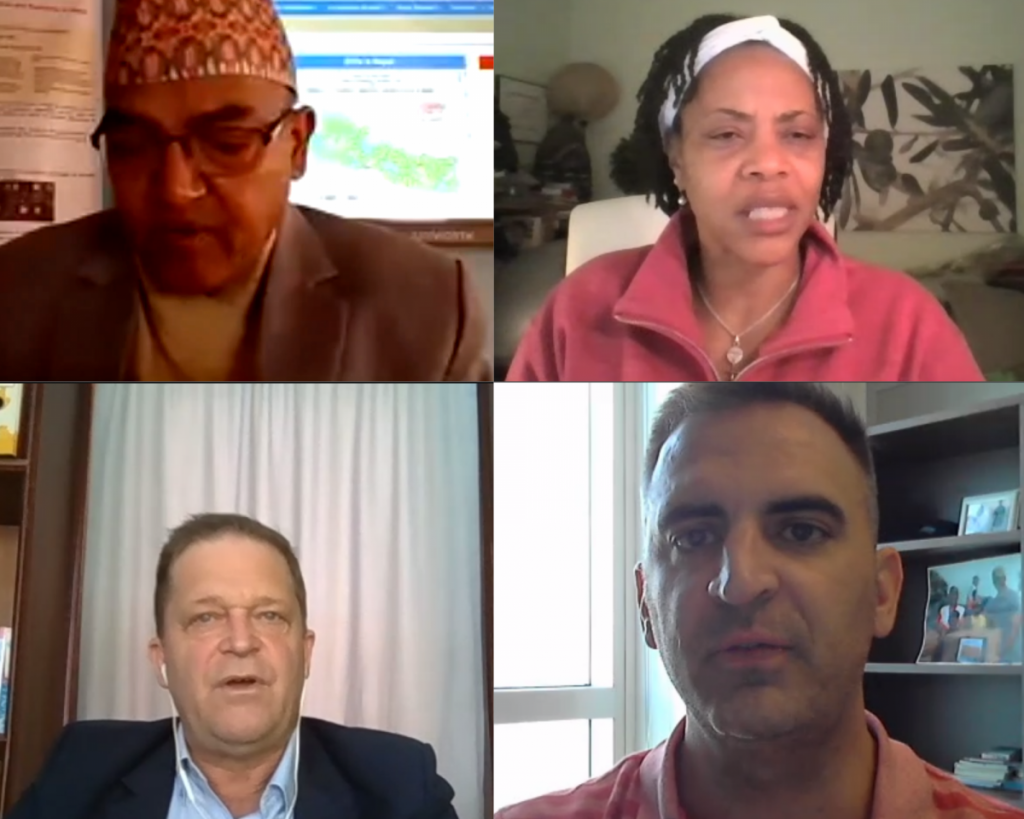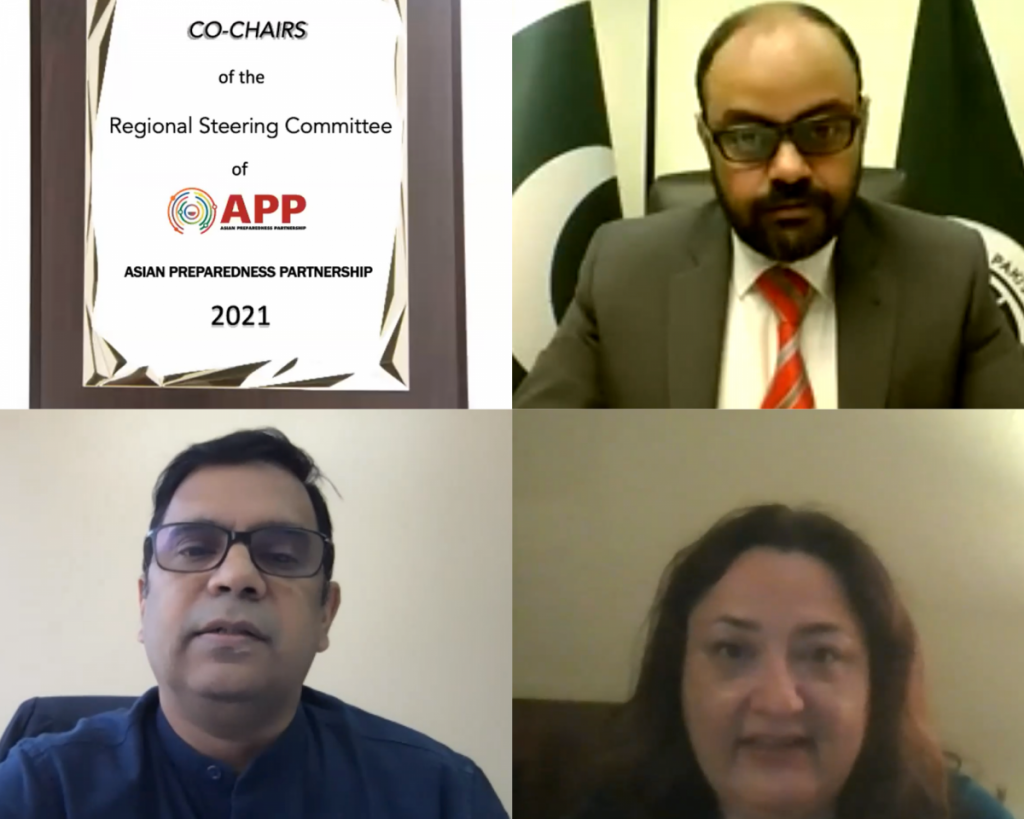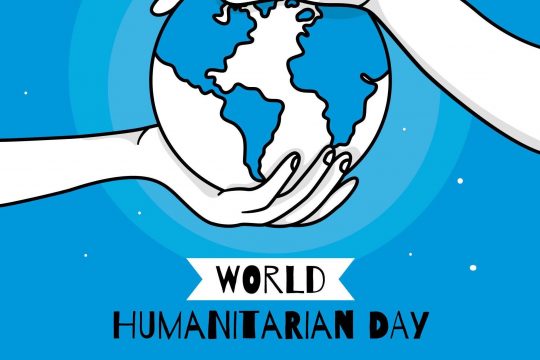Regional cooperation towards a unanimous vision to promote the ‘Localization’ agenda is one of the key focuses of the Asian Preparedness Partnership (APP). The 6th Regional Steering Committee Meeting of the APP on 11 December 2020 provided an avenue to consolidate that vision. Members from the Regional Steering Committee (APPRSC) of the APP countries- Cambodia, Myanmar, Nepal, Pakistan, the Philippines, and Sri Lanka, representatives from the Bill & Melinda Gates Foundation (BMGF), USAID Bureau for Humanitarian Assistance (USAID/BHA), and observers from the networks in Laos were in attendance.
This year’s meeting was held online due to COVID-19 restrictions. The event was an opportunity for national preparedness partnerships to reflect on their progress and how they adapted their activities in light of the pandemic and share their interventions and plans for 2021. At the regional level, it was an opportunity to share information on key interventions on regional coordination and cooperation as well as South-South learning and knowledge exchange.
Mr. Hans Guttman, Executive Director, Asian Disaster Preparedness Center (ADPC), and Secretary of APP welcomed everyone to the session. He expressed how the virtual meeting was an opportunity to think of how adapting to unforeseen events is more crucial than ever, “At this meeting, we need to reflect on the impact of COVID-19, the opportunities it presents, and modified interventions by the National Preparedness Partnerships.” He then invited the Co-Chairs of the APPRSC from the Nepal Preparedness Partnership (NPP) for the year 2020 to preside over and facilitate the meeting. Mr. Janak Raj Dahal, Chair of the NPP from the Ministry of Home Affairs (MOHA), stated that 2020 was a unique year to be the co-chairs of the APPRSC, “The reflections of this year can guide how we can redesign the planned activities to be more effectively implemented in 2021.”

The first opening remarks were given by Dr. Valerie Bemo, Deputy Director, Emergency Response, BMGF. She affirmed that this year has led to deeper understandings of how to integrate health into overall risk preparedness as it trickles down to affecting economies and communities with innovation and creative approaches- “This year’s disasters have reminded us of the importance of awareness. We cannot wait or be reactive. We need to be with the community to prepare, respond, and recover.” She was followed by Mr. Jonathan L. Baker, Regional Advisor – East Asia and the Pacific, USAID/BHA. He linked the partnership with the goals of the USAID, “The APP’s goals align with our commitment to self-reliance and private sector engagement. We want to make our partner countries more self-reliant so they can handle challenges such as alleviating poverty and addressing humanitarian disasters.”
Nations Under Their New Normal
The first session centered around updates from the six national preparedness partnerships. It included reflections for the year 2020, key learnings, the impacts and challenges of COVID-19, and key interventions planned for the upcoming year under APP Phase 2. Participants were able to ask questions to each of the representatives from the countries after their presentations.
The discussion continued with updates at the regional level that included the progression of program implementation through APP Phase 2, the additional support to APP countries for COVID-19 preparedness and response, and the support from USAID/BHA for Lao PDR and Cambodia for strengthening preparedness for emergency response through multi-stakeholder cooperation. The enhancement of the South-South learning and knowledge exchange through the COVID-19 resource page, case studies, and virtual initiatives such as the webinars, Regional Technical Working Groups (RTWG) meetings, and online dialogues were also shared.
The partnership will promote the ‘thinking outside the box’ approachin implementing activities, scaling out APP approaches, and enhancing South-South learning and knowledge exchange. Innovation for DRM was also cited as a priority. The main highlights of the landscape analysis study on innovation for DRM undertaken by the APP secretariat were shared along with its plan to announce the Social Innovation Grand Challenge 2021. The session concluded with progress updates from the members of the Regional Technical Working Group on ‘Inclusive Approaches in Localization (RTWG-IAL) and Regional Technical Working Group on Advancing the Private Sector Engagement in Disaster Risk Management (RTWG-PSE).
Passing the Torch
Mr. Hans Guttman proceeded over the formal handover of the co-chairship of the APPRSC for the year 2021 to the Pakistan Resilience Partnership (PRP). Brig. Waseem Uddin, Member (Operations), National Disaster Management Authority (NDMA), accepted the Co-Chairship on behalf of PRP. He expressed that they would continue to build on the APP’s strength while also forging new pathways, “The work may seem daunting due to COVID challenges but together we can turn the impossible into the possible.”

The meeting concluded with closing remarks starting with Ms. Pilar Pacheco, Senior Program Officer, Emergency Response, BMGF. She commended everyone for facing the challenges and strengthening the partnership in the process, “The commitment and coordination of the national and regional partnerships speaks of maturity. You have proven that local humanitarian effort is needed more than ever. I know there are challenges but all of the key learning you have all shared will support your initiatives in the year ahead.”
Ms. Pacheco was followed by Mr. Aslam Perwaiz, Deputy Executive Director, ADPC. He reminisced on how the APP was seen as ambitious when it launched in 2017. He highlighted that the partnership was developed with the initiative to strengthen local actions, “Localization is what made the partnership niche. In the last three years, I have witnessed the enthusiasm and excitement of the program. This year has proven that we were able to shoulder the challenges through the local partnership in the member countries.”


